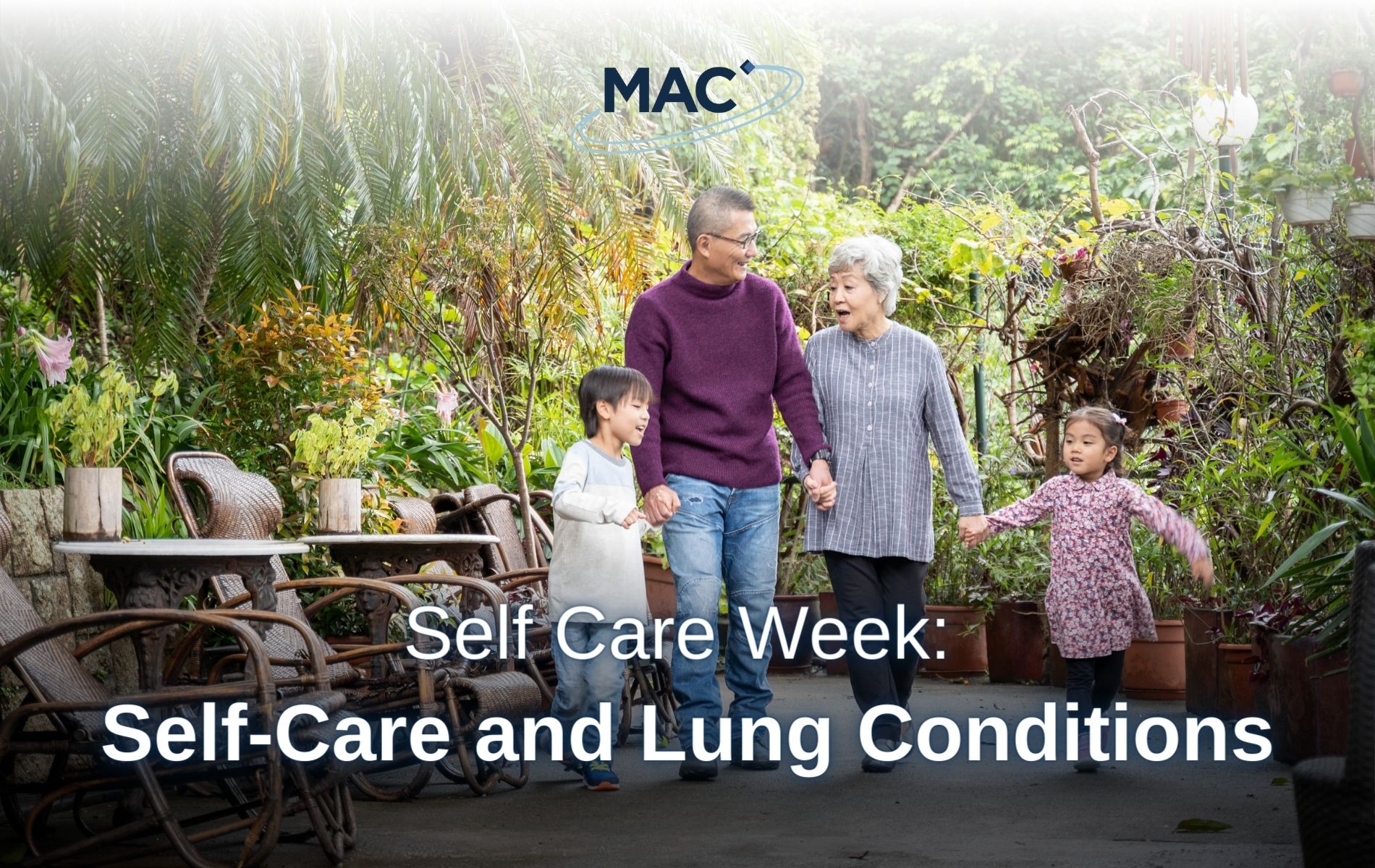Self-Care Week is a timely reminder that taking care of our mental and physical well-being is crucial. Organised by the Self-Care Forum, the theme for this year’s Self-Care Week is ‘Mind and Body’1. In this second blog in our Self-Care Week series, we will be focusing on how self-care can be a resource for those who are living with conditions that affect their body, in particular respiratory diseases which impact our ability to breathe.
In this blog, we’ll be focusing primarily on Chronic Obstructive Pulmonary Disease (COPD) and Idiopathic Pulmonary Fibrosis (IPF).
Differences Between COPD and IPF
Although they are both lung conditions, COPD and IPF differ in many ways. COPD is an umbrella term for conditions that cause breathing difficulties with the two most common being chronic bronchitis and emphysema. COPD often results from long-term exposure to irritants like cigarette smoke, chemical fumes or mold. According to the NHS, 1.2 million people in the UK have been diagnosed with COPD2.
Unlike COPD, which is typically caused by smoking, it’s not clear what causes IPF. The condition is a progressive and often fatal lung disease, characterised by scarring of the lung tissues, making it difficult for the lungs to expand and contract properly. It’s estimated that 30,000 people in the UK live with IPF3.
What is Self-Care?
Self-care is the practice of establishing behaviours to ensure wellbeing and promoting health. For those living with respiratory disease, it can include light exercise, joining support groups, maintaining a balanced diet, or practicing meditation, for example.
One of the most important things those living with lung disease can do to practice self-care is to quit unhealthy habits like smoking. Smoking cessation rates in the elderly (the main demographic of these lung diseases) do vary; in a study of 107 elderly smokers, 52% were able to quit smoking after 6 months4.
Furthermore, psychologists have placed a strong emphasis on the elderly practicing self-care for their overall wellbeing5.
Why is Self-Care Important for Lung Disease?
Living with COPD or IPF can be a significant challenge, but self-care is an indispensable part of managing these conditions. Here’s why self-care is so important:
- Managing Symptoms – Self-care practices are instrumental in helping individuals cope with the symptoms of COPD and IPF. They can provide a sense of control over their condition and improve their overall quality of life.
- Stress Reduction – In a report of hospitalisations from COPD exacerbations, around 60% of respondents reported experiencing psychological distress in their everyday lives6. By managing stress, symptoms may therefore diminish. Self-care techniques, such as relaxation and mindfulness, can help reduce stress and emotional strain. Breathing exercises can also help manage stress and symptoms: the NHS offer Pulmonary Rehabilitation programmes for those living with lung conditions to help with symptoms, 90% of patients who complete these programmes report having higher activity levels, exercise levels, and an improved quality of life7.
- Preventing Exacerbations – Consistent self-care can help prevent exacerbations or make them less impactful on one’s overall health. This is crucial for individuals with severe COPD or IPF, as these flare-ups can be life-threatening.
- Improving Overall Wellbeing – Self-care promotes emotional, physical, and psychological well-being. It can improve self-esteem, mood, and provide a sense of purpose and positivity, improving someone’s quality of life.
Self-Care Week serves as a reminder that self-care is not a luxury but a necessity for individuals living with COPD and IPF. By integrating self-care practices into daily life, those with these conditions can better manage their symptoms, reduce stress, and enjoy a higher quality of life, something that MAC Clinical Research is committed to through clinical trials.
Clinical Trials for Lung Conditions
MAC is looking for volunteers with moderate to severe COPD (aged 40-85) or IPF (aged 40+) to take part in their latest paid clinical research, investigating potential new treatment options for these conditions.
The clinical trials are running at several MAC clinics, primarily across the north of England. Eligible participants will receive reimbursement for their time and commitment to the trial, plus reasonable travel expenses will be paid, or transport provided, as well as a full medical check-up.
For more information on either of the trials, please visit our IPF Clinical Trials webpage or COPD Clinical Trials webpage.
1 Self Care Forum – Self Care Week
2 NHS – Digital service to manage high-risk chronic obstructive pulmonary disease (COPD) patients
3 British Thoracic Society – BTS ILD Registry Annual Report 2020: a summary of the UK IPF Registry for the general public
4 Medicine (Baltimore) – Smoking cessation rates in elderly and nonelderly smokers after participating in an intensive care smoking cessation camp
5 American Psychology Association – Psychologists emphasize more self-care for older adults
6 Journal of the COPD Foundation – The Association of Low Income and High Stress with Acute Care Use in COPD Patients
7 NHS England – Pulmonary rehabilitation




